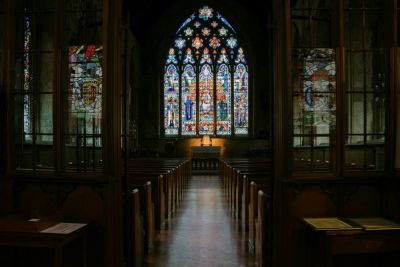Spires and Crosses: A Bastion of Catholicism in Anglican London

The following is part three in a series in the weekly Spires and Crosses column on historic or otherwise interesting churches in London that few, if any, tourists know exist.
Pre-Reformation England was one of the most pious Roman Catholic countries. So much so it is widely reported that more English churches were dedicated to Mary than in France, Italy or Spain, the countries more commonly associated with Catholicism.
Flash forward to the 19th century, when the established Church of England was losing its preeminence and old laws restricting the ability of Catholics to freely worship, among other things, were lifted. Catholic emancipation would culminate not only in the open celebration of the Roman mass but also the return of the Catholic episcopacy.
Because they were deprived of the churches at the time of Henry VIII's split from Rome, Catholics were generally forced to build new houses of worship for the growing Catholic community. This in turn gave rise to prominent ecclesiastical architects — think Augustus W.N. Pugin.
One exception is St. Etheldreda's in London.
The 13th century Gothic-style church was acquired — or rather, re-acquired — by Catholics in 1874.
Originally part of bishop of Ely's palace — it was common practice for prelates and nobility to maintain a London house — it fell into gradual disuse as the surrounding palace deteriorated to the point where it was demolished in 1772. The church remained, but congregations, including Welsh-speaking Anglicans, came and went.
Restored by Sir George Gilbert Scott, who was perhaps the leading Gothic Revival architect, Catholic worship returned in 1879 with solemn high mass celebrated on the Feast of St. Etheldreda.
While, like other historic London churches, a subsequent restoration was needed to repair damage caused by German bombs in World War II, a visitor to St. Etheldreda's feels as if they have been transported to a time before England gave up the old religion of Rome. That is especially true on Sunday mornings, when the old Latin mass is sung.
The church is set back from curb of Ely Place, which is lined with Georgian townhouses-turned-offices that were built after the old bishop's palace was demolished.
You enter through an otherwise nondescript street-level entrance that takes you through a hallway. On the right are stairs to the mediaeval-looking crypt. Straight ahead are another set of stairs and eventually an old wooden door that opens to a narthex created from the installation of a screen during the 19th century restoration.
That is where your eyes will immediately focus on the gigantic east and west windows. The stained glass is post-World War II, as the German bombs destroyed the Victorian glass.
The walls are lined with statutes of English martyrs — Catholics who refused to abandon Rome — that surely are politically incorrect in this age of ecumenism across Christian denominations. And if you look closely to the right of the high altar you will see a small box that serves as a reliquary for what is purportedly part of a hand of St. Etheldreda.
If you go
St. Etheldreda's Church is open Monday through Saturday from 8 a.m. until 5 p.m. On Sunday, doors close at 12:30 p.m.
Spires and Crosses is published every Sunday.




















